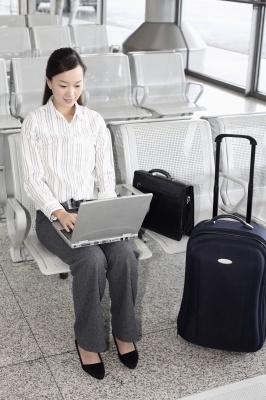While traveling, people should never forget to protect their personal data. According to security experts, imprudent habits like publishing boarding pass pictures on social networks or accessing insecure free Wi-Fi hotspots can put your privacy in danger.
Have you ever posted your boarding pass picture on social networks? If so, your data security could be at stake. According to Andy Hurren, a Solution Architect at Intel Security, people should pay more attention to the information they publish and who is going to see it. The trend of making your flight information public, undoubtedly, enhances user’s possibility of being victims of cyber crimes. For instance, hackers can easily decipher the barcodes of a boarding pass using specific websites and gain free access to your personal data: they can detect your frequent flyer numbers, steal your points or, in the worst scenario, they could even steal your identity.
 While traveling, your data privacy is also endangered by untrusted free Wi-Fi hotspots in public areas. As free Wi-Fi hotspots located in airports, train stations and other public areas are often open, meaning there is no encryption to protect your data, people could end up being victims of hacking attacks. This is a matter of concern, considering that many users do not check if the free Wi-Fi connection provided at a public place is secure. According to news.com.au, a survey by Intel Security revealed that 32% of 14,000 travelers interviewed between the ages of 21 and 53 do not check the security of a network before accessing it.
While traveling, your data privacy is also endangered by untrusted free Wi-Fi hotspots in public areas. As free Wi-Fi hotspots located in airports, train stations and other public areas are often open, meaning there is no encryption to protect your data, people could end up being victims of hacking attacks. This is a matter of concern, considering that many users do not check if the free Wi-Fi connection provided at a public place is secure. According to news.com.au, a survey by Intel Security revealed that 32% of 14,000 travelers interviewed between the ages of 21 and 53 do not check the security of a network before accessing it.
Unsecured free Wi-Fi hotspots are the perfect opportunity for hackers to access and steal sensitive information, such as email accounts or credentials. Not to mention that, as Mr Hurren stated, these “fake access points” are often created on purpose to easily access people’s data. Hackers install these fake access points, also known as rogue access points, in a location with an existing network. As a consequence, when trying to access the official “Free Wi-Fi” network’s name, people are instead connected to the rogue SSID and their personal data are therefore in danger.
Travel security must be taken into careful consideration, and people should take precautions to protect their information as much as possible. As it is said, prevention is better than cure. Next time you want to upload your boarding pass picture on Instagram, it is better to cover or blur the personal information on it as much as possible. You can protect your navigation easily: for instance, by browsing https websites, instead of http. In this way, all the information shared between your browser and websites is encrypted and therefore cannot be intercepted.
Related articles

